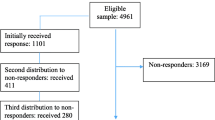Abstract
Dispositional optimism has been linked in previous studies to better health outcomes. We sought to examine the independent associations of dispositional optimism and depressive symptoms with physical and mental functioning in a cohort of healthy middle-aged and older men. The study was conducted among 659 subjects in the Veterans Administration (VA) Normative Aging Study. Dispositional optimism and depressive symptomatology were measured in 1991 and 1990, respectively, by the Life Orientation Test and the Center for Epidemiologic Studies-Depression Scale (CES-D). The dependent variables, functioning and well-being, were measured in 1992 by the Medical Outcomes Study Short-Form Health Survey (SF-36). In multivariate regression models, optimism was associated with higher levels of general health perceptions, vitality, and mental health, and lower levels of bodily pain, but not to physical functioning, social functioning, or role limitations due to physical or emotional problems. Depressive symptomatology was associated with reduced levels of functioning across all SF-36 domains. The findings for optimism and depression were statistically significant after mutual adjustment in multivariate regression models. Optimism and depression are independent predictors of functional status among aging men.
Similar content being viewed by others
References
Scheier MF, Carver CS: Effects of optimism on psychological and physical well-being: Theoretical overview and empirical update.Cognitive Therapy and Research. 1992,16: 201–228.
Scheier MF, Matthews KA, Owens JF, et al: Dispositional optimism and recovery from coronary artery surgery: The beneficial effects on physical and psychological well-being.Journal of Personality and Social Psychology. 1989,57: 1024–1040.
Scheier MF, Matthews KA, Owens JF, et al: Optimism and rehospitalization after coronary artery bypass graft surgery.Archives of Internal Medicine. 1999,159: 829–835.
Cederbald M, Dahlin L, Hagnell O, Hansson K: Coping with life span crises in a group at risk of mental and behavioral disorders: From the Lundby Study.Acta Psychiatrica Scandinavica. 1995,91:322–330.
Andersen BL: Surviving cancer.Cancer. 1994,74: 1481–1495.
Smith TW, Pope MK, Rhodewalt F, Poulton JL: Optimism, neuroticism, coping, and symptom reports: An alternative interpretation of the Life Orientation Test.Journal of Personality and Social Psychology. 1989,56: 640–648.
Wells KB, Stewart A, Hays RD, et al: The functioning and well-being of depressed patients.Journal of the American Medical Association. 1989,262: 914–919.
Bell B, Rose CL, Damon H: The normative aging study: An interdisciplinary and longitudinal study of health and aging.Aging and Human Development. 1972,3: 5–17.
Scheier MF, Carver CS: Optimism, coping, and health: Assessment and implications of generalized outcome expectancies.Health Psychology. 1985,4: 219–247.
Radloff LS: The CES-D scale: A self-report depression scale for research in the general population.Applied Psychological Measurement. 1977,1: 385–401.
Stewart AL, Ware JE:Measuring Functioning and Well-Being: The Medical Outcomes Study Approach. Durham, NC: Duke University Press, 1992.
Brazier JE, Harper R, O'Cathain A, et al: Validating the SF-36 Health Survey questionnaire: New outcome measure for primary care.British Medical Journal. 1992,305: 160–164.
McHorney CA, Ware JE, Raczek AE: The MOS 36-Item Short-Form health Survey (SF-36): II. Psychometric and clinical tests of validity in measuring physical and mental health constructs.Medical Care. 1993,31: 247–263.
McHorney CA, Ware JE, Lu JFR, Sherbourne CD: The MOS 36-Item Short-From Health Survey (SF-36): III. Tests of data quality, scaling assumptions, and reliability across diverse patient groups.Medical Care. 1994,32: 40–63.
Jenkinson C, Coulter A, Wright L: The SF-36 Health Survey Questionnaire: Normative data from a large random sample of working age adults.British Medical Journal. 1993,306: 1437–1440.
Scheier MF, Carver CS: Optimism, coping, and health: Assessment and implications of generalized outcome expectancies.Health Psychology. 1985,4: 219–247.
Plomin R, Scheier MF, Bergeman CS, et al: Optimism, pessimism, and mental health: A twin/adoption analysis.Personality and Individual Differences. 1992,13: 921–930.
Seligman MEP:Learned Optimism. New York: Alfred A Knopf, 1990.
Author information
Authors and Affiliations
Additional information
Channing Laboratory
Department of Veterans Affairs Outpatient Clinic
Preparation of this manuscript was supported in part by the VA Health Services Research & Development Service. Dr. Kawachi is supported by a Career Development Award from the National Heart, Lung, and Blood Institute and is a core member of the MacArthur Foundation Network on Socioeconomic Status and Health. Dr. Sparrow is an Associate Research Career Scientist of the VA Medical Research Service.
About this article
Cite this article
Achat, H., Kawachi, I., Spiro, A. et al. Optimism and depression as predictors of physical and mental health functioning: The normative aging study. ann. behav. med. 22, 127–130 (2000). https://doi.org/10.1007/BF02895776
Issue Date:
DOI: https://doi.org/10.1007/BF02895776




